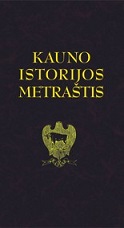Didžioji Armija Kaune ir jo apylinkėse 1812 m. birželį
The Great Army in Kaunas and Its Suroundings in June 1812
Author(s): Dariusz Michał NawrotSubject(s): History
Published by: Vytauto Didžiojo Universitetas
Keywords: 1812 m. Rusijos–Prancūzijos karas; Didžioji armija; Kaunas; miestiečiai; Napoleonas; karinės operacijos; 1812 Franco-Russian war; Great Army (Grande Armée); Kaunas; townsmen; Napoleon I; military operations
Summary/Abstract: For crossing the borders of Russia, Napoleon deliberately chose a place near Kaunas, convenient for bridge building. Napoleon admitted that specifically Kaunas surroundings suited all the necessary conditions for a successful military operation. In June 1812, the emperor of France was planning an unexpected appearance of the Great Army at the river Nemunas and the defeat of the Russian army located near Vilnius. However, the famine became a great threat to Napoleon’s solders by the time they reached the borders of the Russian Empire. The inability to ensure provision for the soldiers and horses already during the first days of the war appeared to be the major problem, which lead to the fall of discipline in the army, and the failure of the military operation. Due to the planned actions of the Russian Empire, Lithuanians could not supply the troops of the Great Army. The soldiers were taking food from the local people by force, the numbers of the deserters grew, and the marauding bands were devastating the country. When the Nemunas was crossed (24th of June), rainstorms began. The temperature dropped from 35°C to several degrees above zero. The horses could not endure this sudden change in temperature, thus the roads reminded of swamps full of the odour of decaying animals. Though the emperor took certain precautions, due to the shortage of food, sudden meteorological changes and the resulting fall of the discipline, the troops of the Great Army devastated Kaunas and its surroundings.
Journal: Kauno istorijos metraštis
- Issue Year: 2013
- Issue No: 13
- Page Range: 73-89
- Page Count: 17
- Language: Lithuanian

